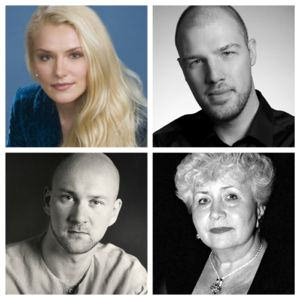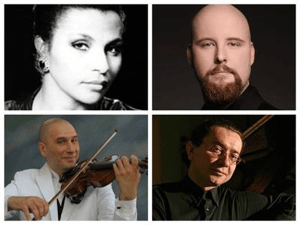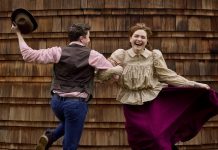The Russian Chamber Art Society (RCAS) has become the go-to organization for those in the know in the DC area when it comes to rarely heard—and rewardingly performed—works from the Russian classical repertoire. Friday night’s exhilarating Ballades, Fantasies, & Satires, with performance of twenty-four pieces by four of its leading proponents, made many of those in the packed Austrian embassy wonder why more of them haven’t yet gained currency with a wider audience.

Soprano Natalya Kraevsky, in an autumnally golden, delicately sequined evening gown, opened the program with two songs by Mikhail Glinka, the first sung not in Russian (as were the rest but one), but in Italian—a striking choice, given that Glinka has been called the founder of the nationalist school of Russian composers. But his teachers were Italian, Austrian, and German, and as a young man, he went to Italy to study; so it worked as both a reminder for those who know Glinka, but have never heard his art songs, and the most delightful of cautionary tales for fans of his operas and symphonic works, who think they do.
In “If, Amidst Joys” an emotional miniature whose four lines of verse express a passion that even death, vows the poet, will not dim, Kraevsky captured the musical sense of the piece, the voice well supported, the phrasing, shading and dynamics persuasive. Swiftly switching gears, in “To Her,” the voice rising with brilliant timbre and falling with subtle darkness, she seized the song’s enraptured professions of adoration. Eyes sparkling, gleefully teasing, Kraevsky whisked her listeners along vocally, gesturally and dramatically on a merry ride through the headlong, at times seemingly heedless bliss of infatuation but which, at its rewarding core, was informed by a wry and knowing self-possession. Throughout both selections, pianist (and coach) Vera Danchenko-Stern, the RCAS’s founding artistic director, provided a highly attentive and empathetic partnership.
Bass Grigory Soloviov’s first two selections of the evening, also by Glinka, were comparatively colorless and straightforward in tone and delivery. In “To Molly”, a romantic strain in the style of Verdi, Soloviov’s demeanor was controlled and very pleasant, the voice gentle and restrained, while “Midnight Review,” an evocation, in urelievedly martial rhythm, of soldiers and band members rising from the grave, was declaimed in an appropriately military tone, matching the singer’s bearing.
Pianist Alexander Shtarkman took the stage to offer an at times touching, at times powerfully moving reprieve: Sergei Rachmaninov’s Morceaux de Fantasie, Op. 3. A celebrated pianist in his own right, Rachmaninov knew well the challenges, either daunting or irresistible, he would be offering his fellows. In “Élégie”, Shtarkman began contemplatively, progressing as though drawn inexorably into a raging, almost ecstatic fortissimo of grief, concluding in a muted, ruefully angry acknowledgement and hushed, shattered acceptance.
In the more familiar “Prelude in C# minor”, he lit into the quadruple-“f” fortissimos and descending arpeggios with terrifying intensity, a prelude of its own to the fantastically acrobatic “Polichinelle”. Meticulously precise and relentlessly determined, his fingers flew across the keyboard like bullets from an AK-47, the electrifyingly slam-bang, leap-from-your-seat ending serving as a fitting conclusion.
Soprano Natalya Kraevsky returned with songs by a composer who is little-known here; a situation which, judging by the three she sang, is to be regretted: Alexander Dargomyzhsky, who is said to have “bridged the gap in Russian opera” between Glinka and Tchaikovsky. “Oh Fortunate Rose”, a love song sung in Italian, demonstrated Kraevsky’s mastery of the vocal through-line, communicating mood and meaning while giving space to the sound. “The Lad and the Maiden”, set to a short poem by Alexander Pushkin, tells a wistful tale of young love. Here, the singer smiled throughout; and while this may have been a perfectly valid choice—the maiden, in the end, “smiled at him through her silent tears”—this reviewer would have liked to have seen an acknowledgement of the emotions inherent in that phrase, as well as of those in the song’s earlier references to “weeping bitterly,” jealousy, and “quiet nurturing.”
“As On Our Street” offered Kraevsky another chance to show her acting chops in the humor department, and she carried off the operetta-like number with absolute aplomb. The lyrics, this time by the composer, depict a marital quarrel that escalates from the husband’s coaxing and pleading “sweet talk,” to the wife’s not-tonight-I’ve-got-a-headache “digging in her feet,” to had-it-up-to-here hubby’s “thundering” threats, to the wife’s comically affectionate and lighthearted capitulation. However we in the 21st century may react to this little scene, Kraevsky did the composer proud and threw herself into it, her eyes at turns batting, begging or winking, her mouth forming a moue or a grin, her arms and hands refusing, withdrawing, or warmly welcoming. The pièce de résistance was the concluding top note, which Kraevsky let fly with a vital, vibrant, pure and ringing assurance.
Concluding the first half of the program, Grigory Soloviov offered two contrasting songs. Dargomyzhsky’s weary but undaunted “Old Corporal” (lyrics by political satirist Vasily Kurochin) is going to be executed for returning a young officer’s insult after having one too many. “Forward, march, fellows, one, two, one, two!” he cries, then reflects on “our native village” where “our fields are greener,” which he will never see again—and his wife. “My God! The old woman is still alive. . . /Don’t tell her a thing,” he implores—then turns again to mock-command the march. Soloviov conveyed the story well, his voice rising gruffly, then excitedly, then fearfully, then stiffly, his hands expressively sculpting the narrative arc.
Modest Mussorgsky’s “Mephistopheles’ Song of the Flea” (from Goethe’s Faust), the arguable king of the evening’s satirical selections and a reliable audience favorite, did not fail to delight this one. Soloviov was masterful here: eyes popped wide, with a crazed gleam, eyebrows arched, teeth bared like a rabid tiger’s, his laughter booming and pitch-perfect as he recounted the tale of the king who ordered courtier’s clothes for his flea, made him a minister, and awarded him a star. “And all his relations got the same.” (Well, we are in Washington.)
The second half of the program offered a major temporal shift: the songs were by Dmitri Shostakovich, a 20th-century composer whose works bridged the musical traditions of three centuries. Soloviev offered his rarely heard Op. 62 song cycle, To the Poems of English Poets, each of the six songs set to a well-known verse and translated by either Samuil Marshak or Boris Pasternak.
“To His Son,” by Sir Walter Raleigh, begins with a ghoulish piano introduction, the fingers of Danchenko-Stern’s right and left hands simultaneously striking the keyboard’s highest and lowest extremities. While this can be counted as one of Shostakovich’s atonal pieces, and justly so: Sir Walter warns his son of “The wood . . . which makes the gallow tree” and “The weed… which strings the hangman’s bag,” Soloviov’s simple, unvarnished declamation, rather than depriving the solemn testament of affective impact, instead managed to impart to it a quality of grace and nobility.
Two poems by Robert Burns, “O Wert Thou in The Cauld Blast” and “MacPherson’s Rant”, were poles apart, both from each other and in the first song, intrinsically: the words are a stirring assertion of deep affection, a pledge of loyalty and protection, while the music is dry and lifeless; as was, of necessity, the interpretation. The second was true to its title: the Scotsman’s pugnacious fury in the face of his imminent hanging was rendered with jagged, raging force by Soloviov and Danchenko-Stern.
“Jenny” (also by Burns) begins with a capricious piano introduction that recalled the phrase, “tinkling the ivories.” It also contains the famous couplet couple, “Gin a body meet a body / Comin thro’ the rye / Gin a body kiss a body / Need a body cry?” Soloviov excelled in the sustained low notes of Shostakovich’s Brahms-meets-Sondheim treatment of Shakespeare’s “Sonnet LXVI,” then concluded the cycle with humorous alacrity and full-throated sonority for the composer’s bumptious setting of the three-line British nursery rhyme, “The Grand Old Duke of York”.
Soprano Natalya Kraevsky returned to the stage for the final set: Shostakovich’s Satires (Pictures from the Past) Op. 109; Poems by Sasha Chiorniy. According to the liner notes for Hyperion Records’ MP3 “Russian Songs,” the six poems are “a mixture of anecdotes, parodies of nineteenth-century Russian verse and aphorisms”; most of the songs “employ parody and light musical genres throughout. Although the mood is outwardly satirical and even lighthearted, Shostakovich maintains an unsettlingly dark subtext.”
And for good reason: Shostakovich had twice fallen victim to Stalin’s purges, his music excoriated as “coarse, primitive and vulgar.” Now, in 1960, having been brought a comprehensive volume of the poems of the formerly out-of-favor Cherny (spellings vary), he set a cycle of songs to several, dedicating it to his friend, the soprano Galina Vishnevskaya, who, as Washingtonians know, would marry cellist and later, National Symphony Orchestra conductor Mstislav Rostropovich, and perform here.
The first song, “To a Critic”, is strident, short and atonal, with a jazz-infused piano riff at the end. Kraevsky, now in a short-sleeved, deep turquoise satin gown with a turquoise filigree overlay of lace roses, attacked its attack on the critic—who assumes that whatever a poet writes about, deep down, it’s really about him—with panache and vigor.
Kraevsky next tackled “Spring Awakening”, but read it aloud to us first (as she had with a few of the first songs), clearly enjoying this cat’s tale: “Yesterday my tomcat looked at the calendar and lifted up his tail immediately, / Then he flew up the staircase, as in [the] old days, shrieking crazily: / ‘Springtime marriage! Feline wedding! Hurry up you lady-cats, on to the roof!!’ ” it begins. Kraevsky acted it out entertainingly with cat’s claws, wide eyes, loud-meow mouth and sinewy motions, without ever sacrificing the discipline of vocal production and delivery—not an easy task, as the song is a relentless two and a half minutes of what sounded like forte, fortissimo and triple, even (knowing Shostakovich) quadruple-“f” singing. As the woman who lives with the freaked-out feline, Kraevsky humorously exploded with astonishment (“And my cactus – oh wonder of wonders – flooded with tea and coffee grounds, / Suddenly resurrected like a modern Lazarus!”) or dismay (“The frost no longer stings anyone, but many, as in winter, have nothing to eat….”) at the many, sometimes unwelcome (“The trees are waiting, the water stinks, and there are more drunks than ever”) signs of spring. The concluding whoop!-like high note was spine-tingling.
Which didn’t prepare us for “Posterity” (or “Descendants”), the next song in the cycle, a very “Russian”-sounding lament, but still containing Shostakovich’s characteristically challenging top notes and shouts. It is nonetheless highly expressive, as were the singer (who read it to us beforehand, offering additional insights) and her accompanist; Kraevsky again handled it masterfully, aided as always by Danchenko-Stern’s astute and technically superb accompaniment.
Next came Shostakovich’s rendering of a “Misunderstanding” between a “curly-headed and hot-blooded brunette” bachelor and an alluring—and ostensibly loving—poetess. As the song, which begins tenderly, progresses, we learn that all is not as it first appears. Kraevsky was hilarious in portraying both roles: the poetess, with her sudden changes of mood, from voluptuous temptress, to teasing sex kitten, to violently outraged “respectable Lady,” and the eager—then bewildered—then terrified man.
The final song in the cycle, and final selection of the evening, was “The Kreutzer Sonata”, which has nothing to do textually with the famous piece by Beethoven, but begins, several measures in, with an approximation of the sonata’s opening bars, then moves into a French, Les Mis-like cadence. (Suggesting that Shostakovich may have had an influence on Schönberg—not Arnold, but Claude-Michel.)
As in “Misunderstanding”, here, too, Kraevsky moved amusingly and effortlessly from emotion to emotion, as a glum tenant sitting on his suitcase silently contemplates the laundress’s calves, not knowing how she wishes she could “take him by the hair and burn him with [her] springtime lips.” Given that outside the embassy lay several inches of snow, with a treacherous glaze of ice to come, there could have been no better way to end the concert. All four performers came onstage to receive a sweeping, and well-deserved, standing ovation.
Running Time: Two hours and 45 minutes, with one intermission.
The Russian Chamber Art Society’s Ballades, Fantasies, & Satires concert was performed on Friday, February 27, 2015 at 7:30 PM at the Embassy of Austria – 3524 International Court, NW, in Washington, D.C.

For information about their April 17, 2015 concert: “From Moscow to Hollywood– Songs from the Movies” go to their website. Purchase tickets online.
RATING:




